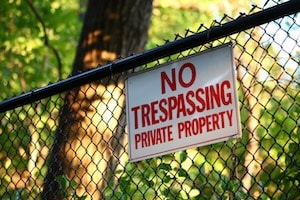Long Island Trespass Lawyer
Experienced Trespass Attorneys in Long Island, NY

If you have been charged with a trespass offense, you will want to get immediate legal advice. Long Island trespass attorney Edward Palermo has devoted his career to representing the rights of those who have been charged with crimes on Long Island. For over 29 years, criminal defense lawyer Ed Palermo and his team of defense attorneys at Edward Palermo Criminal Defense have been staunch advocates for those who must navigate the criminal justice system. We can help.
Levels of Trespass Offenses
Trespass offenses are considered property crimes. New York’s trespass laws have multiple degrees of charges, with varying degrees of severity and penalties.
A simple trespass, or entering and remaining on someone’s property without permission, while not a criminal offense, is considered a violation and can result in fines, community service, or even a 15-day jail sentence. Furthermore, the trespasser may be held liable for any damages they have caused to the property.
Criminal trespass laws are more serious and can range in criminal charges from a misdemeanor to a felony. The degrees of criminal trespass charges become more significant when accompanied by other charges. Criminal trespass charges will vary depending on the type of building entered, whether the individual had a criminal history, and whether that individual was carrying a weapon.
- Criminal trespass in the third degree is considered a Class B misdemeanor, carrying a maximum sentence of 90 days in jail.
- Criminal trespass in the second degree is considered a Class A misdemeanor, carrying up to a one-year jail sentence.
- Criminal trespass in the first degree is considered a Class D non-violent felony, carrying two and one-third to a seven-year prison sentence.
Edward Palermo Criminal Defense is a law office that provides legal representation in criminal defense cases. If you are facing a criminal charge, it is important to hire a skilled criminal defense lawyer to represent you. Trespassing is a serious offense that can result in hefty fines and a prison sentence. Our lawyers have the experience and knowledge required to defend you against your charges and uphold your rights.
To schedule a free consultation with an experienced criminal defense lawyer, contact (631) 265-1052.
| Trespass Level | Example | Penalty |
|---|---|---|
| Simple Trespass | Entering and remaining on someone’s property without permission | Fines, community service, or 15-day jail sentence |
| Criminal Trespass in the Third Degree | Unlawfully entering a property specifically enclosed to prevent intruders, a property used as a school or camp, a housing project, or a railroad yard | Class B misdemeanor, up to 90 days in jail |
| Criminal Trespass in the Second Degree | Unlawfully entering a dwelling or a school attended by the offender’s victim | Class A misdemeanor, up to 1 year in jail |
| Criminal Trespass in the First Degree | Unlawfully entering or remaining on someone else’s property while possessing a weapon, deadly weapon or explosives, or entering a public building or business where they have been advised not to enter or to leave by the owner | Class D non-violent felony, 2 and 1/3 to 7 years in prison |
Criminal Trespass Charges in the Third Degree
Under New York Penal Law § 140.10, criminal trespass in the third degree involves an individual unlawfully entering a property specifically enclosed to prevent intruders, a property used as a school or camp, a housing project, or a railroad yard. Unless you have authority or permission to be there, if you have entered one of these types of properties, you may be charged with criminal trespass in the third degree.
Criminal Trespass in the Second Degree
Under New York Penal Law § 140.15, criminal trespass in the second degree involves an individual who unlawfully enters a dwelling. The term dwelling is defined as a building where people usually lodge overnight. Trespass in the second degree can also be charged when a registered level 2 or level 3 sex offender enters a school attended by their victim.
Criminal Trespass in the First Degree
Criminal trespass in the first degree is the most serious of trespass charges.
Under New York Penal Law § 140.17, criminal trespass in the first degree involves an individual who has unlawfully entered or remained on someone else’s property and who:
- Is in possession of a weapon or knows that another participating individual has a weapon,
- Is in possession of a deadly weapon or explosives
Being convicted of criminal trespass can result in time behind bars, extensive fines, and a criminal record that will follow you for life. When you have been charged with criminal trespass on Long Island, there may be some legal defenses available to you.
Criminal defense attorney Edward Palermo and his legal team at Edward Palermo Defense are experienced legal professionals who understand the stakes and aggressively represent clients facing serious trespass charges. Let us help strategize your best possible legal defense. We will consider all possible options when it comes to defending your legal rights and protecting your future.
Criminal Defense Attorney Edward Palermo Criminal Trespass and Burglary
Criminal trespass and burglary both involve unlawful entrance onto a property. Under New York law, burglary occurs when an individual enters or remains in a building unlawfully with the intent to commit a crime. Once that individual enters the building with that intent, a burglary occurs regardless of whether the intended crime occurs.
There are three classifications of burglary under New York law:
- A third-degree burglary occurs when an individual has knowingly entered or remained in a building with the intention of committing a crime while inside. This is considered a Class D felony and can carry up to seven years in prison and fines of up to $5,000 or double the value of whatever the individual has gained from the crime.
- A second-degree burglary occurs when the offender is in possession of a deadly weapon or explosive, causes physical injury to someone not related to the burglary inside the building, uses or threatens someone with a dangerous instrument, or displays what appears to be a firearm. Second-degree burglary charges may also apply if the building is a dwelling. This is considered a Class C felony and can carry up to 15 years in prison.
- First-degree burglary is the most serious of all burglary charges. It differs from second and third-degree charges because it combines all factors of both first-degree and second-degree burglary. Additionally, there is violence or threat of violence involved and the building that is unlawfully entered is a dwelling where others spend the night. This is considered a Class B felony and carries up to 25 years in prison.
While criminal trespass or burglary charges can be sole charges, they are often accompanied by additional charges for other criminal offenses. If you are a suspect or have been charged with criminal trespass or burglary on Long Island, you should consult the experienced Long Island trespass attorneys at Edward Palermo Criminal Defense to ensure that you get the strongest possible defense.
Criminal Trespassing in NY and Other Related Charges
Other offenses are often related to criminal trespass offenses. When these separate charges accompany a trespass charge, penalties will be more severe.
- Criminal mischief involves causing damage to another’s property without their permission. There are four degrees of criminal mischief, each degree dependent on the type and value of the property damage and the criminal history of the defendant. Charges can range from a Class A misdemeanor punishable by up to a year in jail to a Class B non-violent felony punishable by up to 25 years in prison.
- Making graffiti charges involve drawing on or defacing private or public property with the intention of doing damage. This is considered a Class A misdemeanor and is punishable by up to one year in jail. An associated charge, possession of graffiti instruments, is a class B misdemeanor, punishable by up to 60 days in jail.
- Reckless endangerment of property charges involves committing a reckless act that creates a significant risk of damage to someone else’s property with a value of over $250. This offense is considered a Class B misdemeanor and punishable by up to 60 days in jail.
- Criminal tampering charges involve tampering with someone else’s property to cause them inconvenience. There are four degrees of criminal tampering, each depending on the type of property, ranging from a Class B misdemeanor to a Class D non-violent felony.
- Arson involves damage to a building by setting fire or using explosives. There are five recognized degrees of arson that depend on whether the building was occupied at the time of the act, whether individuals were injured, and whether the fire was set intentionally, recklessly, or accidentally. These charges range from a Class A misdemeanor to a Class A-1 felony
Does Trespassing Go on Your Record?
In New York, the severity of the consequences for trespassing varies based on the type of offense committed. Simple trespassing involves entering and staying on someone’s property without permission and is not a criminal offense but rather a violation. Those caught may receive punishment such as fines, community service, or up to 15 days in jail. Additionally, the individual may be responsible for repairs to any damage caused to the property.
On the other hand, criminal trespassing has more severe consequences, resulting in misdemeanor or felony charges depending on the circumstances. The charges depend on several factors, including the type of building entered, the individual’s criminal history, and whether they carried a weapon. For example, criminal trespass in the third degree is a Class B misdemeanor that can lead to a maximum sentence of 90 days in jail. In contrast, criminal trespass in the first degree is a Class D non-violent felony that can lead to a prison sentence of two and one-third to seven years.
A conviction for criminal trespass can lead to imprisonment, substantial fines, and a permanent criminal record. Consulting with an experienced criminal defense attorney who can provide legal defenses for those charged with criminal trespass is essential to protect one’s rights and future.
If you have been charged with trespassing, you need a trespassing lawyer who can help you understand your rights and defend you in court. Our lawyers have the experience to handle criminal cases in the city and surrounding areas. We are available by phone to answer your questions and provide legal advice.
Contact us today to schedule a consultation.
Getting the Representation of an Experienced Long Island Trespass Attorney

Edward Palermo and the Long Island trespass attorneys at Edward Palermo Criminal Defense have devoted over 28 years to the aggressive representation of those who are facing criminal charges. We can provide you with the experienced legal defense you need when you are facing the criminal justice system.
Call us at (631) 265-1052 to schedule a free consultation to discuss your case and possible defense options.


